|

 Deranged, Zachary Baldwin Deranged, Zachary Baldwin
Imagine for a moment what it is like
within the mind of an insane person. This is something that isnít
rational. What is perceived as real doesnít really exist. What is real
affects the body, but the mind masks this with this perceived reality.
To understand this, one understands that the two exist simultaneously
and what happens in one will affect the other.
Welcome to the world of the insane. It is
a world in which any thing can happen. The rules of the real world no
longer apply. The setting for this game is through the eyes of an
insane person. A surrealistic land unfolds, in which the user can do
things that are impossible to accomplish in reality. The object is
simple, explore and try to make your way back to sanity with out being
beaten by white faceless creatures that will pursue the user through
out the game. Let the game, through its imagery and sounds; take you
away from reality for a while. Within the world things donít always
make sense, and certain objects seem to represent the real, but they donít
always look like what they represent. The game will take the user from
a cheerful scenic environment to one that is more nightmarish where the
player cannot see more than ten feet away and images of deformed bodies
are propelled onto the screen. Sit back and live outside of reality for
awhile.
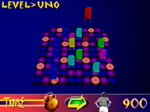 Gravity Test, Rocco Balsamo Gravity Test, Rocco Balsamo
To me, part of the appeal of games is the
fact that you can do stuff that you couldn't do in real life. Another
thing I love about video games is being so addicted to the game that I
forget to eat lunch, or take a shower, or go to class. While
brainstorming about Gravity Test!, these were the things I thought
about.
I was highly influenced by Taito's
Bust-A-Move (http://www.acclaim.com/games/bam99/n64.html), and Tetris
(http://www.tetris.com), as these are the two best puzzle type games
I've ever played. If I am able to reach the level of addictiveness of
these two games, I've done my job as a game designer.
In the game, the player will be dropping
couches, tables and chairs off of a balcony. According to the ESRB
(http://www.esrb.org), my game would probably be rated "E"
for everyone. I was thinking about having the player drop off live
animals, and making the game ridiculously bloody, as an act of humor,
but I decided that I wanted to make a game that everyone could enjoy.
I've listed a few ideas I had for
implementation of the game above, but I'll probably use OpenGL
(http://www.opengl.org) with C++. I've researched several different
API's such as Java3D
(http://java.sun.com/products/java-media/3D/index.html), and DirectX
(http://msdn.microsoft.com/directx). To me, OpenGL seems like it might
be the easiest and fastest way to implement my ideas.
My biggest problem with designing this
game is that I'm too practical. Believe me, I have hundreds of ideas
for really cool games. Unfortunately, I'm limited by my time and
technical ability. If I was to have unlimited time and resources, I
probably would have wanted to design a 3D platform game with a cool
story and lots of beautiful artwork. I'm hoping that one day in the
future, I'll be able to make true on this goal as a bona fide game
developer.
 A Little Rebellion, Nicholas Bennett A Little Rebellion, Nicholas Bennett
A Little Rebellion is an opening up of the
Role Playing Game or RPG genre. RPG games have always been the least
rigid; allowing players to choose their own characters and in some
measure develop their own personality. However the games themselves
more often than not follow a straight line from beginning to finish.
You have a clear goal and it is expected that you will react in certain
ways. I feel that ďthe right pathĒ should not restrict you when making
your way through a game. It is important that you be allowed to make
your own mistakes.
To that end I will be developing a vehicle
by which one can do just that. I will be making a game that is as open
as I can possibly get it without losing its playability. To do this I
will use the existing reputation score as a gauge of the players
progress. The reputation will be used to determine what standing you
are in with rebel leaders, and whether or not you are more sympathetic
to the governmentís side in the dispute. I will be using some form of
the Infinity Engine, since there are already a plethora of third party
editors that will allow me, with my non-existent programming skills, to
create A Little Rebellion.
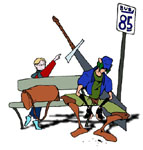 Vigilante City, Paul Berestesky Vigilante City, Paul Berestesky
South Shore City is under siege. Giant
mutated creatures created by a madman in a secret island lab are
harassing the metropolis on a daily basis. The monsters come ashore, do
a little "romp du splat", as monsters tend to do, and
eventually either go back to the island or are destroyed. Since the monsters
are such a pain in the bureaucracy, town hall passes a ruling that
anyone fighting the monsters will not be responsible for the damage
they do to the fair city. And so a fresh crop of monster fighting
forces springs up overnight and goes amok on the metropolis doing more
damage than the monsters ever did.
 RPI Trivia, Diane Braun RPI Trivia, Diane Braun
There is just something satisfying about
kicking your friend's ass in a trivia game; showing off that you know
more useless information then they do, or that you paid better
attention in your 6th grade social studies class when you were learning
about African Tribes. Growing up as the youngest, I always thought that
my parents and sisters knew more of the answers to Trivial Pursuit, so
it wasnít any fun playing with them. Now as a young adult, playing You
Don't Know Jack, I realized that my friends aren't smart or dumber then
I, as I once thought my family was, but they just know different thing
then I do. So my goal of this project is to put all of the students on
RPI's campus on an equal playing field in a trivia game. My proposal is
to create a trivia game based on useless facts about RPI that virtually
everyone knows thus making the playing level equal. However, I chose to
portray these facts in complex, philosophical, ingenious questioning,
making you have to know more then just what the question is asking
about RPI, but other random world information. The "fun
factor" is the ability to show off your knowledge and be rewarded
(with points) for it. I am hoping that through sounds and
visualizations this game with have a high fun factor.
 Knock Hockey, Nathan Faust Knock Hockey, Nathan Faust
The game of Slant-Hockey is based on the
childrenís games nok-hockey, pool and miniature golf. Slant-Hockey is
designed with the fast action of hockey, but the thought and skill of
miniature golf. The point of the game it to hit the puck into the
opponentís goal while skillfully calculating the angle and force to hit
the puck.
I have played many rounds of mini-golf and
have been frustrated at times due to hitting the ball inaccurately. I
feel this program will help children understand geometrical concepts
such as angles and elements of physics such as force. For the title of
this project, I started out by calling it Math-Hockey, but felt it need
a twist. So I then called it Angle-Hockey, but it did not have the
ring. After looking up Ďangleí in the thesaurus, I found the word
Ďslantí, which I feel represents the idea for the game quite well.
While putting a slant on the original rules to nok-hockey, the board
will be placed in an un-conventional setting enabling the user to have
fun while learning.
 Megalo Mania 4000, Jeff Gordon and Anca Georges Megalo Mania 4000, Jeff Gordon and Anca Georges
This game demo of Megalomania is the
result of three straight weeks of almost continuous programming,
testing, debugging, and graphical design. Still, there is only one
thing that comes to mind. This isnít even in the realm of what I would
like to be presenting as the demo for this game. My ideas seem far too
large to be compressed into a game demo in such a short time. This is
not to say that Iím not pleased with how far Iíve gotten in such a
short time. I have come up with a short and simple introduction to the
simplest parts of the game interface. This demo will introduce the user
to gaining skills, moving their characters, and producing buildings and
tools. The graphics are incomplete because I did not have time to
produce polished graphics as well as a sample of game play. Now that I
have produced the foundation for the game, adding other parts to it
will not be very hard at all. I have done the hard part. Iíve learned a
lot about programming, graphic design, and trying to slam the two
together into something that both looks good and plays well. I hope you
enjoy the game, programming it has consumed every free moment Iíve had
since its inception. And Iíve enjoyed it!
-Jeffrey
"Gunther" Gordon
The main idea of the game is the concept
of evolution, combined with the popular SIM games. Unlike the SIM
games, our game is better because youíre unlimited to the number of
things you can do. You can pretty much evolve differently depending on
how you choose to live and what you build. The game is intended as a 3d
game, but for now we only have a 2d demo. I worked on a 3d trailer and
the trailer shows a desolate island and then it shows how the people
constructed huts and rafts on the island. The point of the game is to
see how you will live thousands of years since the beginning of the
game. Thatís all. J
-Anca
Shannon Georges
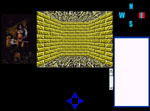 The Lost Souls, Aaron Hamai, John McGlynn, and
Nick Olson The Lost Souls, Aaron Hamai, John McGlynn, and
Nick Olson
You are awakened by a faint humming in
your ears. The hum gradually fades into muffled, distant voices which
seem urgent and frantic, but whose words are unintelligible.
Slowly you open your eyes. Through a grey
fog, you see what appears to be yourself, lying on the operation table.
In the background surgeons and nurses dart back and forth, but their
figures are as murky as their voices.
"Am I dead?"
You feel weighed down with sorrow as you
realize your fate. Your lifeless body begins to float away, as if you
are sinking into oblivion. Soon the operating room has faded from view
and you are surrounded by darkness.
You float in nothingness for what seems to
be an eternity when a pinpoint of light appears in the distance. You
grasp for the light, for the promise of an afterlife, and the pinpoint
grows larger. Soon you stand before a shimmering door of light through
which you can see paradise, and without hesitation, you step through.
As soon as you set foot in your paradise,
you feel an intense force pulling at you, pulling you away from the
light. Heaven flashes past you and you feel as if you're hurtling
through the darkness again as everything around you becomes black.
 Cat 'n' Mouse, Ian Jaffe Cat 'n' Mouse, Ian Jaffe
When I was a kid I played lots of puzzle
games, mostly ones that were made for the Nintendo Entertainment
System. Tetris was one of my absolute favorites. The concept was
simple. I would be given different shapes and would try and form lines
with them. The graphics were rather bad, but that did not matter. What
made it fun was that there was something in it that kept me playing.
And it is the strategy in the puzzle games that make them fun. Even
today most people would agree that puzzle and strategy games are two of
the best types of games because they are both fun and challenging.
Imagine a game where every time you play,
you are getting a different experience. Not only that, but also imagine
a game that seamlessly integrates a strategy game with a puzzle game. I
have come up with an idea for a game that does just this. Also in this
game I have found a way to give the player the ability to modify the
world within the game, thus making it a different game every time. My two
goals with this project are to make the game as fun and as unique as
possible. It is also important that it is playable and re-playable.
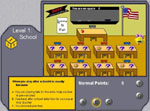 Hegemony, Michael Kaplin Hegemony, Michael Kaplin
Hegemony is an interactive director game
depicting the consequences of nonconformity in three institutions;
School, Church, and Corporation.
This project is my senior capstone for
RPI's EMAC degree. The final version completed for my capstone contains
a fully functional first level of the program which takes place in
school. Further levels although planned have not produced due to time
constraints
Hegemony is described in the Fontana
Dictionary of Modern Thought as "Political and economic control
exercised by a dominant class, and its success in projecting its own
way of seeing the world, human and social relationships as 'common
sense' and part of the natural order by those who are, in fact,
subordinated to it."
 IQ Bridge, Linda Kim IQ Bridge, Linda Kim
Many successful games today are developed
from simple concepts and designs. Games like Tetris, Snood,
Minesweeper, and Pac-Man are good examples of this trend. There are
more elaborate and large-scale games out there such as Quake and
Diablo, but I am more attracted to the more simplistic games that I can
play online or on my computer during my breaks. I have friends who play
Diablo non-stop. And I mean non-stop, skipping meals and even sleep! I
do not think these kind of games are very healthy for people. Of
course, it really depends on the players and they must moderate
themselves. Also, making the game as addictive as possible is the goal
of most game programmers. As for myself, I chose to develop a game that
people can play leisurely, and a game that is addictive without
dictating the players' lives.
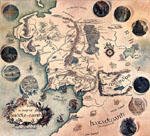 Middle Earth Role Playing, Colin Kinsella Middle Earth Role Playing, Colin Kinsella
The game I intend on building is a
multiplayer network game based on Middle-Earth Role Playing game. The
whole concept I wanted to create was a way to make the paper and pencil
game easier and more fun. I thought my idea was unique the way I wanted
to create the game until someone directed me to the game called Vampire
the Masquerade. Although, I couldnít download an evaluation version of
the game, from all the demos on the gameís website it did not appear to
have one idea that I have. I want the game master to be able to
communicate with the other players through a microphone attached to the
computer. That way the game master can act as a narrator, and take the game
play past conventional methods of game play. I also, do not want to
make the game single player which Vampire the Masquerade was.
 VRPI, Jennifer Ortiz VRPI, Jennifer Ortiz
My interest in this project started when I
was talking with a friend about how often you hear students complaining
about RPI. As a joke I talked about a SimCity-type game where you're in
charge of RPI, but no matter what you do, the students complain. The
novelty of such a game would last about five minutes. Why not make a
game where you could really make your students satisfied -- unless, of
course, you valued reputation or other factors more. Or maybe you'd try
to balance things as much as possible.
VRPI will put the player into the role as
the RPI administration. The player will run RPI as he or she sees fit.
Some decisions will be simple, and others more complex. Some will
involve compromising between conflicting interests. In the end a
dedicated player should be able to do well, despite setbacks, and
perhaps even make RPI into a "world-class university."
It's not just about choices, but about
perspective. Everyone in the game has their interests -- the
administration, the students, the faculty, the parents, and so forth.
These interests are what define the interactions. A large part of this
project for me is research -- I want to get it right. My main target
audience is RPI students, but it could be of interest to other people,
as well.
 DarkHop, Joshua Rodriguez, and Ted Davis DarkHop, Joshua Rodriguez, and Ted Davis
Threads of Fate
Perhaps one of the things that most
interests me about video games is the possibilities that arise to tell
a story. Any story imaginable can be turned into a game. Be it a
fantasy, a science fiction story, a grand adventure, you name it and it
can be done. One of the more interesting things about games
(particularly with the advent of 3-D games), is the fact that games
have become much more cinematic. Now, the validity of games delving
into aspects of cinematography can be debated endlessly, but the point
is many people actually are interested in being able to become new
characters in order to explore new worlds and situations, in multiple
episodes, storylines, or sequences. Many games are more about the
story. This, in my opinion, is one of the more compelling aspects of
games nowadays, taking the reins of any given character's destiny and
having a sense that you are that character. From this, though, stems my
concern about cinematic and interactive game experiences. The control
you are given over a story is limited to "complete mission A, move
on to mission B, etc." and that, to me, is the
"downfall" of these games. There is limitless potential to be
explored in giving the player the opportunity to dynamically change
when, where, and how a character's story progresses. Many games seem to
give you limited control over this (RPG's like Final Fantasy or Chrono
Trigger come to mind), but not many games actually give you total
freedom of what you are doing with specific consequences deriving from
your decisions. In other words, you aren't just controlling the story,
but rather given the option to seemingly create your own story.
How to do this becomes troublesome,
though. How much control do you grant the player? How free is the
story? How big is the world? One way I would like to explore this would
be by creating one main situation and diverging from that main
situation in 2 or more side stories which eventually come together to
conclude the main situation. Bear in mind, though, the main situation
doesn't necessarily have to be played in the same way. In one version,
you could fight the ringleader of the villains, whereas in the end of
another of the situations, you fight merely one of his lackeys. The
Sega Saturn game "Guardian Heroes" does this rather well. You
start off with a set of characters and as you progress, new characters
join your team and new paths and villains cross your adventure. In this
game, how you solve individual situations eventually affects what is
happening in other timelines or situations. In the game I am trying to
create you would then have multiple characters spreading off in
different directions with different purposes. Spatially, your
characters might be inhabiting the same space, but each character or
situation involves its own mission, which in turn, influences the whole
and final situation.
Various films actually play around with
this idea of having multiple storylines or situations running
throughout the film intersecting only at key points. In
"Snatch," for example, you are treated to (essentially) three
storylines: an underground boxing promoter and his quest for respect
and money; a group of thugs hoping to steal a very valuable jewel; and
a gem collector hoping to get his hands on this jewel. Many of the
characters in each storyline don't have much to do with the other
storylines, but something meaningless in one sequence can have a great
impact on the other storyline. What "meaningless" event could
happen in one sequence of a game, which could affect other sequences of
that game? Witness Star Wars Episode I. The final part of the film has
four battles going on simultaneously: the Gungans battle the
Battledroid army, Queen Amidala infiltrates her own castle to arrest
the invading Neimoidians, Qui-Gon Jinn and Obi-Wan Kenobi battle Darth
Maul, and finally the Starfighter fleet attacks the Trade Federation
control ship. The outcome or success of every battle relies on the
other battles. For example, the success of the Gungans lies in the
destruction of the Trade Federation ship, which ensures the capture of
the Neimoidians; the Jedis' success determines the Queen's safety, etc.
What if you were given control of any of these situations? Which would
you focus on? What if you lose in one battle? All of these
possibilities are very good examples of what I hope to explore.
Tying this into theme parks, how can you
create a ride that changes according to the riders' preferences? How
does that affect the content of the ride? Can it be done physically, or
is space to much of a concern (i.e. best suited for simulators)?
In the end, my interest is in creating an
interactive and ever-changing sequence of stories where the user
determines where it will go and how it will get there. These shouldn't
just be a point A, point B, or point C, but a whole web of
possibilities (a rhizome, if you will), where you have to take full
responsibility of the character and the experiences that come with
making certain decisions.
-Joshua
RodrŪguez
The main premise of my interest in the
design of my game has to do with the use of multi-characters in real
time. Similar to the use of multiple scenes in the movie Timecode, in
my game I will explore the use of multiple characters acting
individually, or grouped in real time.
At the start of the game the player will
start with a singular character, this is to get him/her used to the
game's control and play. The second primary character of the game then
accompanies the main character rather shortly after. Later in the game
the player will have the option of adding one of two (possibly more options
in full version) secondary characters to their party. Each of theses
secondary characters will have abilities that will allow, and
necessitate, them to do certain actions in the game. Along with there
added abilities they will also give the party access to certain
restricted areas (i.e. one of the secondary characters might know a
guard at one of the towns, where he can convince the guard to sneak
them in to a certain restricted part of the town), and vice versa they
might also be restricted from certain areas due to the association with
that character. At some points in the game the group will be forced to
either work together, or separately depending upon the task at hand.
Each character will have their own special
abilities that will allow them to complete a certain part of the game.
Similar to the latest Zelda, Majora's Mask, as Link you collect masks
that allow you to change shape, which give you special abilities in
order to complete a certain task. The difference in our game is that
each character will have their own individual abilities, similar to the
game Lost Vikings. The collection of certain items and development of
these objects throughout the game will supplement the abilities of each
character. Similar to the fashion of some items in Final Fantasy IX,
certain items have special abilities attached to them, the more you use
them more of their special abilities are unlock.
The game play at present will consist of a
primary screen with two sub screens for the characters not being
actively played at any one time. The layout will be similar to that of
picture in picture displays in TV's
The active control of the character will
be similar to a classic side scrolling game in the sense that you will
have the option of two basic actions with the A and B button (i.e.
Supermario A-jump B-run). The variation will come in the fact that the
player will be able to change the controls, he/she will have the choice
of four actions of which they can set the A and B buttons. These four
options will be slightly different for each character. Each character
will have the three similar options: fight, use special item, and
push/pull/jump. The variation comes in the fact that each character
will have one of the following special abilities: flying, swimming
underwater, shooting, and hiding (stealth/camouflage). Each of these
special actions will have an attached menu that will allow you to
modify the special action (maybe?).
All of the screens will be running in real
time so the player will also have to switch between screen depending
upon what is going on in the sub screens, this will be done with the Z
and R buttons on the nes 64, or with the R1 and L1 buttons on the ps
controllers. This is where the game starts to get complicated, along
with visual clues, audio clues will also have to be incorporated, to
help the player decide which screen is the most important at any time
in the game.
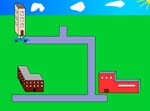 Not in my Dorm Room, Chris Ruiz Not in my Dorm Room, Chris Ruiz
My goals for "Not in My Dorm Room!!!
Or How I Learned to stop Fearing Public Safety" are to take a
satirical look at the idea of an organized police force on American
college campuses. I do not want to make a game that only RPI students
can relate to but a game that any student who is at a school with a
campus police force can play and understand the points being made. This
idea is interesting to me primarily because I have always had a problem
dealing with authority figures. It isn't that I am simply a rebel
without a cause or really a rebel at all, just that when someone or a
group tries to force their morals or beliefs on me I really do not take
it very well. I chose campus police forces to raise an issue about
because I find irony in the situation their existence creates. We as
students are thrust into a new situation when we begin college with
countless new freedoms that are in most cases not experienced in high
school life. So on one end there is that and then on the other end is
the enforcement arm of college institutions that are basically there as
a deterrent to students against participating in activities deemed
"unacceptable" by the administration of the institution. I
understand that people need structure and here at RPI we do not have it
as rough as students at other schools but at the age and maturity level
you are at when you are ready to go to college, is it really necessary
for us to be policed by a group of people who for the most part have
experience completely unlike our own (few, if any of the public safety
officers have attended school here at RPI for example)? Maybe what I am
suggesting is an impossible utopia where students live peacefully and
without incident but even so, I don't really see the need for my life
to be bordered by people waiting to arrest me for violating a campus
ordinance. Another point is campus police forces are caught in a limbo
zone of not quite being police officers but still having jurisdiction
over students. I realize that they are not generally as strict as
police in general but still, I find it hard to respect someone who has
the ability to arrest me with out being an actual cop. I also realize
the other, non-draconian side of campus police forces such as acting as
a deterrent for crimes against students such as burglaries or assaults
and do appreciate it but what I would prefer is having that end without
having them force the moral and ethical standards of the institution on
me. After all, we all come to college with our own sets of beliefs and
morals and that is what makes any institution diverse. If the views of
the institution are pressed into us, we lose both our diversity as a
group and our individuality as people.
 Entertain the Fish, Gwynne Vriesema Entertain the Fish, Gwynne Vriesema
Children love to play Mad Libs, the game
where you create your own story by filling in the blanks with the
correct type of word (noun, adjective, etc.). The resulting story is
usually silly and nonsensical, thus the name of the game. When I was
younger, I played a similar game, with a few differences. The teacher
would write the beginning sentence of a story on the board, and we
would go around the room, creating the story one sentence at a time.
Similar to Mad Libs, the resulting story generally wound up not making
much sense, but it was fun to see what we would think of next. I propose
a game that is patterned after this; it would have two playable
versions, both on the internet. One version would be a poetic Mad Lib;
the second version would be multi-player, in a message board format.
|